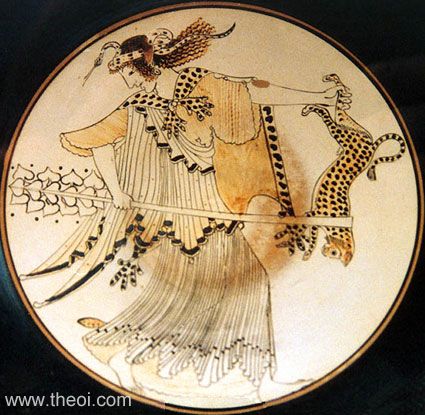THYIA
Greek Name
Θυια
Transliteration
Thyia
Latin Spelling
Thyia
Translation
Bacchic Frenzy (thyia)

THYIA was the Naiad-nymph of a spring on Mount Parnassos in Phokis (central Greece). Her shrine was the site for the gathering of the Thyiades--woman celebrants of the Orgies of the god Dionysos.
She was loved by the god Apollon and bore him Delphos, the eponymous founder of the village of Delphoi near the oracle. Thyia was closely associated with the prophetic Kastalian (Castalian) spring from which she was sometimes said to have been born.
Thyia was surely identified with Kastalia (Castalia), the nymph of the spring, Melaine (Melaena), the mother of Delphos in an alternate account, and the Nymphai Korykiai (Corycian Nymphs), Naiades of the sacred Korykian cave.
PARENTS
[1] KEPHISOS (Herodotus 7.178)
[2] KASTALIOS (Pausanias 10.6.4)
OFFSPRING
[1] DELPHOS (by Apollon) (Pausanias 10.6.4)
ENCYCLOPEDIA
THYIA (Thuia). A daughter of Castalius or Cephisseus, became by Apollo the mother of Delphus. (Paus. x. 6. § 2; Herod. vii. 178.) She is said to have been the first to have sacrificed to Dionysus, and to have celebrated orgies in his honour. Hence the Attic women, who every year went to Mount Parnassus to celebrate the Dionysiac orgies with the Delphian Thyiades, received themselves the name of Thyades or Thyiades. (Paus. l.c. x. 4. § 2, 22. § 5; comp. 29. § 2 ; Lobeck, Aglaoph. p. 285.)
Source: Dictionary of Greek and Roman Biography and Mythology.
CLASSICAL LITERATURE QUOTES
Herodotus, Histories 7. 178. 1 (trans. Godley) (Greek historian C5th B.C.) :
"[During the historical Persian War :] So with all speed the Greeks went their several ways to meet the enemy [the Persians]. In the meantime, the Delphians, who were afraid for themselves and for Hellas, consulted the god. They were advised to pray to the Anemoi (Winds), for these would be potent allies for Hellas. When they had received the oracle, the Delphians first sent word of it to those Greeks who desired to be free; because of their dread of the barbarian, they were forever grateful. Subsequently they erected an altar to the winds at Thyia, the present location of the precinct of Thyia the daughter of Kephisos (Cephisus), and they offered sacrifices to them."
Pausanias, Description of Greece 10. 6. 4 (trans. Jones) (Greek travelogue C2nd A.D.) :
"Others maintain that Kastalios (Castalius) (of the Kastalian Spring), an aboriginal, had a daughter Thyia, who was the first to be priestess of Dionysos and celebrate orgies in honor of the god. It is said that later on men called after her Thyiades all women who rave in honor of Dionysos. At any rate they hold that Delphos (Delphus) was a son of Apollon and Thyia. Others say that his mother was Melaina (Melaena), daughter of Kephisos (Cephisus)."
SOURCES
GREEK
- Herodotus, Histories - Greek History C5th B.C.
- Pausanias, Description of Greece - Greek Travelogue C2nd A.D.
BIBLIOGRAPHY
A complete bibliography of the translations quoted on this page.